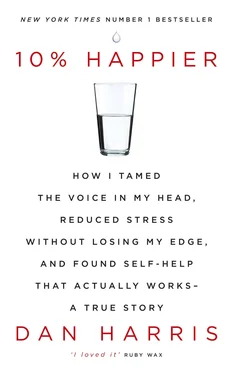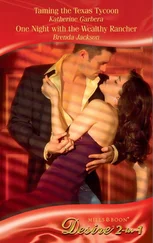Making things more confusing was the fact that even though enlightenment sounded about as realistic as my cats being able to control the weather, everything about Joseph’s bearing signaled that he was, in fact, an uncommonly happy guy.
I’m not sure exactly why, but this enlightenment thing really stuck in my craw. Maybe it was because it made me feel like my 10% solution was insufficient. Or maybe it was because I couldn’t reconcile my admiration for Joseph with the seemingly outlandish things he believed. Did those beliefs call into question the validity of the whole enterprise? If he really bought into enlightenment, could I take anything he said seriously?
Fortunately, back at the office, I was able to shelve that theoretical 10%-versus-100% debate and apply what I’d learned on retreat to the very practical challenges I was facing. I was, in fact, finding mindfulness to be extremely useful.
After an initial period of “how dare he” indignation over Jim Murphy telling me I was never going to be a big-time anchorman, I decided to approach the problem in a Buddhist style: to lean into it, to take his views seriously, no matter how inconvenient they may have been—to respond, rather than react. I forced myself to consider an unpleasant possibility: Maybe I was like a shih tzu who thinks he’s a bullmastiff? A kitten who looks in the mirror and sees a lion?
But no: I wasn’t willing to fully concede—either to myself or anyone else—that Murphy’s pessimistic forecast was accurate. Careers in TV news are too frequently influenced by factors like luck, timing, and executive-level caprice to ever really count anything out. However, the new mindful me, instead of automatically recoiling into denial or rage, was able to see that Murphy probably was trying to be helpful—although he was also undoubtedly aiming to put me in my place so I’d finally sign the damn contract.
On that score, he succeeded. His unsolicited dose of career perspective helped persuade me to throw in the towel and close the deal.
In signing, I told myself that at least now I would be able to officially make the jump to GMA , a job I was convinced would almost certainly propel my career in new and marvelous directions. Untethering myself from the rigid formalism of the evening news would, I believed, open up heretofore unseen vistas. As it turned out, being a morning TV host was not as easy as it looked.
For five years on Sunday World News , I had been helming a true one-man show. Ninety-seven percent of what came out of my mouth was prescripted verbiage written by me and loaded into a teleprompter. When correspondents came on the show to do live shots, I knew in advance what they were going to say. In other words, there were very few surprises. Now I would be part of a cast of four—including a female cohost, a News Reader, and a meteorologist—all of whom were free to say whatever they wanted whenever they wanted. This loss of control created some interesting challenges.
GMA was structured in a way that was loaded with opportunities for ad-libbing, right from the minute we went on the air. That was the point of it, really. The audience wanted to see the hosts interacting spontaneously. The very first thing we did after the “Open” of the show—the preproduced part where you see snippets of the morning’s big stories and then the Good Morning America animation—was called the “Hellos,” during which we would greet the viewers and preview a few of the other stories coming up that morning. Our lines were written into the prompter, but mostly that was just a guide; we were supposed to be having a conversation. However, when the chatter went down a verbal tributary for which I wasn’t prepared, I would sometimes find myself tensing up, nervously shuffling my papers or letting out a forced Ed McMahon–style belly laugh.
This was frustrating for me. Off camera, I was usually able to defuse situations with humor. Part of what was holding me back now was the dawning realization that the jokes that came naturally to me were often better suited to a late-night cable show than to morning television.
Basic logistical questions could also be tricky. How did I sit on a couch—where we did some of the lighter segments toward the end of the broadcast—without slouching or spreading my legs too widely? How did I smoothly extricate the group from conversations when the producers were screaming in my earpiece that we were running out of time to hit the commercial break? No one gave me the memo.
There was also the challenge of adjusting to the content of the show. I had been around morning television for a while, so I knew when I accepted the job that we’d be peddling softer fare than the evening news. I also considered myself an info-omnivore who enjoyed crime and pop culture empty calories along with my nutritious hard news. Nonetheless, I would sometimes find myself outside of my professional comfort zone: playing judge in a live weigh-in contest to determine which Chihuahua was the world’s smallest, competing in a gingerbread house–making contest with my fellow anchors, and—the coup de grace—dancing on live television with a box on my head, dressed up like the Shuffle Bot from the hip-hop band LMFAO.
Fortunately, Nightline and World News continued to provide me with opportunities to do work that put me firmly back in my comfort zone. Wonbo and I did a piece where we interviewed evangelical pastors—whose faces and voices we agreed to alter in order to protect their identities—who had secretly become atheists but hadn’t yet ginned up the courage to tell their flocks. I confronted Governor Jan Brewer of Arizona about her refusal to set free an elderly convicted killer even after her own clemency board unanimously recommended his sentence be commuted. (I surprised the governor by bringing the inmate’s son to a news conference. The two of us fired questions at her in tandem. She fled pretty quickly.) Most significantly, I did a full half hour on Nightline about the saga of an eighteen-year-old boy I’d met in Iraq and helped move to America to attend college. Much as the Bush administration had naively believed that Americans would be “greeted as liberators” after the invasion, I had assumed this young man (who, ironically, was also called Dan—a Kurdish name) would thrive upon arrival here. I had grown very attached to him, and when he got kicked out of school for misbehavior, I spent several years—and an enormous amount of emotional energy—trying to get him straightened out, only to be frustrated at every turn by his adolescent intransigence. I recorded every twist of this running drama, shooting much of it myself on a small camera. I couldn’t help but view Dan’s actions through the lens of the Buddhist concept of suffering. He was never satisfied where he was; he always assumed that the next big life change would solve all of his problems. Ultimately, to my profound disappointment, he ended up moving back to Iraq—a decision he regretted immediately.
Back on weekend GMA , I was discovering that the gig did have some upsides. Notwithstanding my occasional stiffness, our little team was getting nice feedback. Our colleagues and bosses gushed about how we had “good chemistry.” I really liked the other members of the on-air team. My female cohost was a lovely young woman of Moldovan descent, named Bianna Golodryga. We had known and liked each other for several years before she became my TV wife. (The similarity of her name to that of my real-life wife was a bit delicate, though. On my first official day on the job, I said, “I am now permanently one consonant away from destruction.”) The News Reader was Ron Claiborne, a drily funny former print reporter. At first, we had a rotating cast of weatherpeople, until the bosses hired a vivacious young meteorologist from Chicago named Ginger Zee. (Zee is a shortening of her real—and awesome—last name: Zuidgeest.)
Читать дальше












